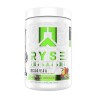
BCAA is one of those slogans that sounds familiar to many, but... not necessarily understandable. What exactly are these mysterious letters? How do they work? Who needs them – and more importantly – when? Is it a product only for professional bodybuilders or also for people who just want to feel good after training? Find out what is BCAA!
What is BCAA and why is it so important?
BCAA is an abbreviation for "Branched Chain Amino Acids", or amino acids with a branched side chain. In practice, we are talking about three important compounds: leucine, isoleucine and valine. What does BCAA do? They are responsible for the processes of muscle building, regeneration and protecting the body from catabolism (muscle breakdown).
The human body cannot produce them itself, which means that we have to supply them from the outside – with food or supplements. Although they are found in animal proteins (meat, eggs, dairy products), their concentration may be insufficient, especially during intensive training.
Check also, what is L-glutamine.
What are BCAA and why are they so important for active people?
· Leucine – activates muscle protein synthesis processes.
· Isoleucine – regulates blood sugar levels and increases endurance.
· Valine – takes part in tissue regeneration and reduces fatigue.
Supplementing with BCAAs not only allows you to regenerate faster after training, but also increases the effectiveness of effort – which translates into better results and a lower risk of injury.
When is it worth supplementing with BCAAs?
When to take BCAA? This is one of the most frequently asked questions. And rightly so – because not everyone needs them to the same extent. Here are some situations when BCAAs can be really helpful.
Training on an empty stomach
If you exercise in the morning, without a previous meal, the body can reach for energy from the muscles. BCAA supplementation will protect muscle tissue from breaking down.
During fat loss
During weight loss, we lose not only fat, but also muscle. BCAA help prevent this by providing “fuel” for the body without additional calories.
During strength and endurance training
The more intense the effort, the greater the risk of micro-injuries in the muscles. Supplementation before and after training (e.g. BCAA powder Trec Nutrition) accelerates regeneration and reduces soreness.
For people on a plant-based diet
A vegan diet may lack the right amino acid balance. A well-chosen BCAA supplement replenishes deficiencies without having to change your diet.
In what form should you take BCAA?
BCAA comes in different forms – each has its advantages. It is important to match the product to your lifestyle and the way you train.
Dissolving powder
The most frequently chosen – easy to take before, during or after training. Just mix with water and you're done. Recommended products:
· BCAA 8:1:1 Zero Cola 250g – BioTechUSA – ideal for those who don't want sugar and like the classic taste of cola,
· BCAA EAA Tropical 378g – Ryse – more than just standard BCAA. It combines BCAA and EAA (complete exogenous amino acids), making it a comprehensive support for muscles.
Tablets and capsules
Convenient, no need to mix, perfect for people who train away from home or don't like the taste of supplements. Recommended products:
· BCAA 6000 – 100 tablets – BioTechUSA – high dose in a convenient form, easy pre-workout supplementation,
· BCAA 1100 Mega Caps – Olimp Nutrition (120 capsules) – ideal for people who expect a high concentration of amino acids in each capsule.
Liquid form
It absorbs quickly, often has a refreshing taste – a good choice for people who don't like tablets and powders. Recommended product:
· Liquid BCAA Orange 1000 ml – BioTechUSA - ideal for taking to training, with a taste that doesn't get boring after three days.
When is the best time to take BCAA?
BCAA is a well-tolerated supplement, but – like everything – it should not be used thoughtlessly. Too high doses can disturb the balance of other amino acids (e.g. tryptophan), which can affect mood or sleep. How much BCAA per day? The basis is moderation and appropriate dosage – usually 5-10 g before or after training is enough.
What is BCAA powder? When should you take them? Summary
BCAA are branched-chain amino acids (leucine, isoleucine, valine), supporting muscles and regeneration. Supplementation is especially effective during fasted training, reduction and high effort.
They come in the form of powder, tablets, capsules and liquids – everyone will find something for themselves. And remember: BCAA should be used wisely – preferably 5–10 g per day, adjusted to the intensity of training.
Regardless of whether you train professionally or just want to take better care of your body – well-chosen BCAA can really improve
Learn more and check what is L-citrulline.


